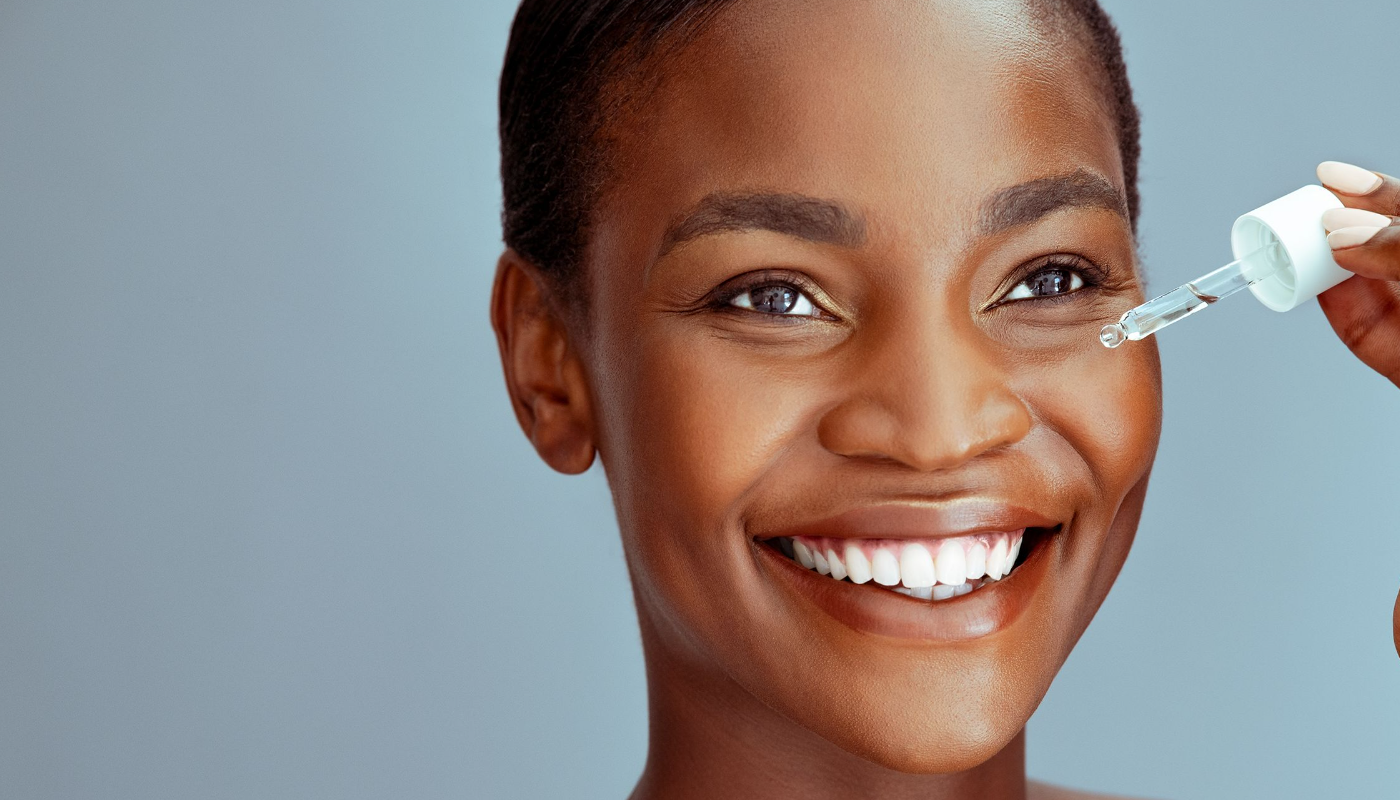What Retinol Is and How To Use It
New to Retinol?
Retinol is a true hero in the skincare game. Imagine having a magic wand that could make your skin look younger, clearer, and more glowing. That's what retinol is like for many people. It's not just another trend; it's a trusted friend in bottles and tubes, ready to tackle wrinkles, dark spots, and even acne. But what exactly is retinol, and how does it do all these amazing things for your skin?
Let’s explore what retinol is good for, the different kinds you can try, and how to use it without worrying about irritation. Whether you're new to skincare or looking for ways to upgrade your routine, this guide will help you understand how retinol can be your skin's best ally.
What Is Retinol?
At its core, retinol is a type of retinoid derived from Vitamin A, known for its profound efficacy in skin renewal and repair. Unlike its prescription counterparts, retinol offers a gentler approach, making it an ideal choice for over-the-counter formulations. Its primary function is to promote cell regeneration, paving the way for smoother, more resilient skin.
How It Works
Retinol, a derivative of Vitamin A, is a marvel of modern skincare, celebrated for its profound ability to transform the skin. Its mechanism of action is rooted in its ability to penetrate the outer layers of the skin and work directly on the dermis, where it stimulates the production of collagen and elastin. These two proteins are the scaffolding of the skin, providing it with structure, firmness, and elasticity. As we age, the natural production of collagen and elastin diminishes, leading to the formation of wrinkles and a loss of firmness. Retinol counteracts this process, effectively slowing down the skin's ageing process from within.
Moreover, retinol accelerates cellular turnover, the process by which the skin naturally exfoliates itself. By promoting the removal of dead skin cells on the surface and encouraging the growth of new, healthy cells, retinol helps to reveal a brighter, smoother complexion. This increased cell turnover is also instrumental in clearing acne breakouts, as it prevents the accumulation of dead skin cells that can clog pores and lead to pimples.
What Is Retinol Used For?
Retinol's applications in skincare are vast and varied, making it a versatile ingredient suitable for addressing a wide range of skin concerns:
Ageing Skin
Beyond reducing the appearance of fine lines and wrinkles, retinol helps to improve skin texture and tone, combatting the dullness that often accompanies ageing skin. It also works to tighten pores, which can become more pronounced with age, giving the skin a smoother, more refined appearance.
Acne-Prone Skin
Retinol's ability to unclog pores and regulate sebum production makes it an effective treatment for both teenage and adult acne. By preventing the buildup of oil and dead skin cells, it helps to reduce the frequency and severity of breakouts, while also addressing post-acne marks and scarring.
Pigmentation and Uneven Skin Tone
Hyperpigmentation, including age spots, sunspots, and melasma, can be effectively faded with regular retinol use. By accelerating cell turnover, retinol helps to disperse pigment clusters and diminish the appearance of dark spots, leading to a more even skin tone.
Textural Irregularities
For those struggling with rough or bumpy skin textures, retinol can offer significant improvement. Its exfoliating action helps to smooth out roughness and promote a silky, even skin surface.
Types of Retinol Products
The beauty of retinol lies in its versatility, manifesting in a plethora of products designed to cater to every skin type and concern. From serums and creams to oils and encapsulated formulations, the retinol universe is rich with options:
Serums: Lightweight and potent, retinol serums are ideal for those seeking a high concentration of active ingredients for quicker results. They're perfect for oily or acne-prone skin types due to their fast-absorbing nature.
Creams: For those with dry or sensitive skin, retinol creams offer a richer, more nourishing alternative. These formulations typically combine retinol with hydrating ingredients to minimise irritation while still delivering significant anti-ageing benefits.
Oils: Retinol oils provide a luxurious, deeply moisturising experience, perfect for use at night. They're especially suited for dry or mature skin, offering a slow release of retinol to gently rejuvenate the skin as you sleep.
Encapsulated Retinol: This innovative formulation encapsulates retinol in a protective shell, releasing it slowly to minimise irritation. It's an excellent choice for beginners or those with sensitive skin, as it provides a gentle introduction to retinol's benefits.
How to Use Retinol
Incorporating retinol into your skincare routine requires patience, consistency, and a strategic approach.
Introduction Phase
When introducing retinol to your skincare routine, start with a product that has a low concentration of retinol (0.25% to 0.5%). Apply a pea-sized amount to clean, dry skin two nights a week, allowing your skin to gradually adapt to the ingredient without causing irritation.
Building Tolerance
As your skin becomes accustomed to retinol, you can slowly increase the frequency of application. After a month of bi-weekly use, consider applying retinol three times a week, and then, if your skin responds well, you can move to every other night.
Layering Products
When using retinol, it's important to layer your skincare products correctly. After applying retinol, wait about 20-30 minutes before applying a moisturiser. This waiting period allows the retinol to fully penetrate the skin without being diluted by other products. If you're using other active ingredients, like vitamin C or AHAs/BHAs, consider using them in your morning routine to avoid potential irritation.
Managing Side Effects
If you experience dryness, peeling, or irritation, don't hesitate to scale back on your retinol usage. Incorporate a hydrating serum or a richer moisturiser into your routine to help soothe and repair the skin barrier. Remember, the goal is to support your skin's health, not overwhelm it.
Long-Term Care
Once your skin has fully adjusted to retinol, you can maintain a regular application schedule that suits your skin's needs and concerns. For many, using retinol 3–5 times a week is a sweet spot for maintaining its benefits without causing irritation.
Risks and Potential Side Effects of Retinol
While retinol is celebrated for its transformative effects, it is not without its caveats. Initial use can lead to dryness, redness, and peeling as the skin adjusts to the increased turnover of cells. These side effects are typically temporary and can be mitigated by starting with a low concentration, gradually increasing frequency, and incorporating nourishing moisturisers into your routine. Additionally, retinol can make the skin more susceptible to UV damage, underscoring the importance of daily sunscreen application.
Who Should Skip Retinol?
Retinol is a powerful ingredient, but it's not suitable for everyone. Individuals with eczema, rosacea, or extremely sensitive skin may find retinol too harsh and irritating. Pregnant or breastfeeding women are advised to avoid retinol due to potential risks to the baby. Alternatives such as bakuchiol, a plant-based ingredient with retinol-like benefits, can be considered for those unable to use retinol. Always consult with a dermatologist to find the most suitable skincare ingredients for your specific needs and conditions.
Choose Your Perfect Retinol Formula at Clarion Aesthetics
At Clarion Medical Aesthetics, we pride ourselves on offering cutting-edge skincare solutions tailored to each individual's needs. Our curated selection of retinol-based products is designed to cater to a variety of skin types and concerns, ensuring that every client can find their perfect match. Our expert team is dedicated to guiding you through the selection process, combining our deep understanding of skincare science with a commitment to achieving the most desirable outcomes for your skin. Whether you're seeking to address signs of ageing, improve skin texture, or combat acne, Clarion Aesthetics is your trusted partner in achieving radiant, healthy skin.
Common Questions & Answers
Can Retinol Be Used During the Day?
While retinol is best applied at night due to increased photosensitivity, if used during the day, it should be accompanied by a high-SPF sunscreen to protect the skin from UV damage.
How Long Should I Wait to Apply Moisturiser after Retinol?
Wait about 20-30 minutes after applying retinol to apply moisturiser. This allows the retinol to fully absorb into the skin without dilution.
Can I Use Retinol if I Have Dry Skin?
Yes, individuals with dry skin can use retinol, but it's crucial to select a formulation suited for dry skin and to moisturise adequately. Starting with a lower concentration and gradually increasing usage can also help mitigate dryness.
Is Purging Normal When Starting Retinol?
Yes, purging is a common initial response to retinol, as it accelerates skin cell turnover, bringing underlying issues to the surface. This phase is temporary and typically subsides as the skin adjusts.
How Do I Know if Retinol Is Not Suitable for My Skin?
If you experience severe irritation, excessive dryness, or persistent redness, retinol may not be suitable for your skin. Consultation with a skin care professional can provide alternatives that are better suited to your skin type.
Can Retinol Help with Acne Scars?
Yes, retinol can help reduce the appearance of acne scars by promoting cell turnover and collagen production, which can help to smooth out the skin's texture over time.
Should I Stop Using Retinol if I Get a Sunburn?
Yes, if you experience a sunburn, it's advisable to pause retinol use until your skin has fully healed to avoid further irritation.




